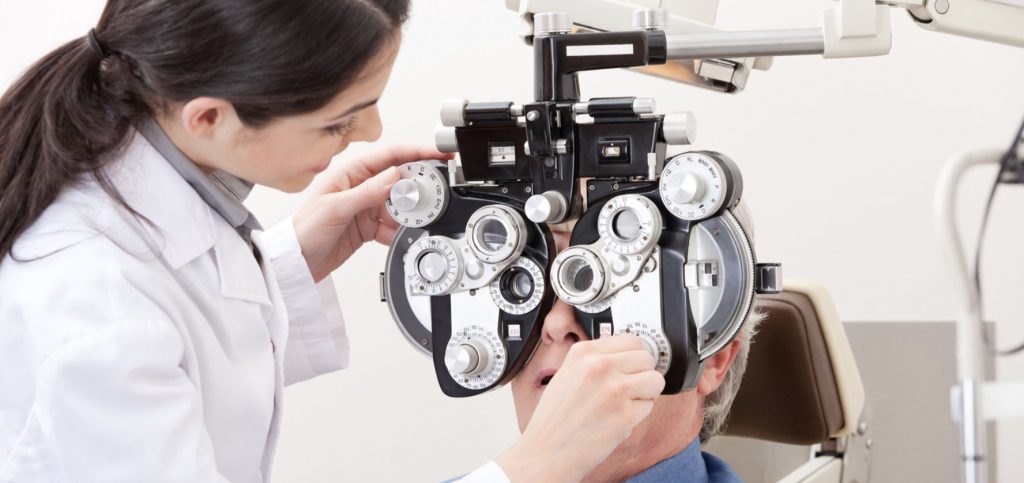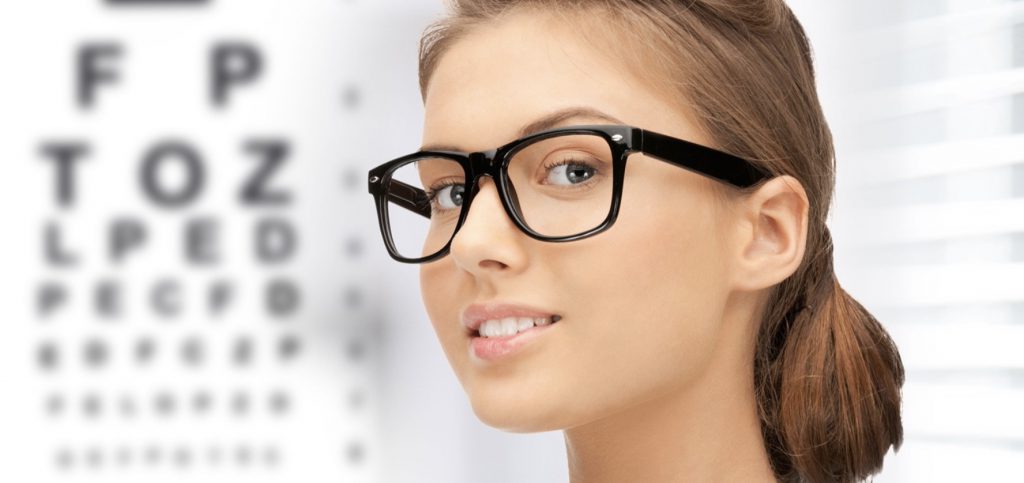Eye Doctor Near Me? How To Find The Right One
Most people look for an eye doctor near them without knowing that there are many eye care specialties and it is import to find the right kind of eye doctor to solve your needs. The most common purpose for an eye doctor is when you need a routine eye exam, and this can be done by an optometrist (OD) or an ophthalmologist (MD). An optician is not a doctor – they can only supply you with eyeglasses, lenses, and contact lenses.

Why Do I Need An Eye Doctor Near Me?
The best way to find the right eye doctor is to focus on your needs first. If you go to the wrong eye doctor because they are near you, you will not get the best service for your needs. For example, if you just need glasses, look for an optician or optometrist. If you need a routine eye exam to get a prescription, look for an optometrist or ophthalmologist. If you are experiencing vision problems, or if you have a specific eye health issue, visit an ophthalmologist first.
Some people choose their eye doctor based on whether the doctor accepts vision insurance benefits. Just like your regular health insurance, you want to find a “good” doctor that is also in the provider network for your vision insurance. While this is a good idea for the routine eye exam, staying in-network to purchase eyeglasses is usually a bad idea because you end up spending more money and/or getting a lower quality product than you could get online or elsewhere.
What Kind Of Eye Doctor Do You Need?
| If You Want A … | Then You Need To Use An… |
| Routine Eye Exam | Optometrist or Ophthalmologist |
| Glasses | Optician |
| Prescription | Optometrist or Ophthalmologist |
| Surgery | Ophthalmologist |
| Diagnostic Test | Optometrist or Ophthalmologist |
| Contact Lens Fitting | Optometrist |
| Contact Lenses | Optician or Optometrist |
| Glaucoma Test | Optometrist or Ophthalmologist |
| LASIK | Ophthalmologist |
| Medications | Optometrist or Ophthalmologist |
Optometrist Near Me Who Write the Best Prescriptions
In general, you will get a better eyeglasses prescription from an optometrist (OD) than from an ophthalmologist (MD). That is because ODs specialize in prescriptions; they write hundreds every week and they really know how to do it well. If you have never been on the receiving end of a poorly written prescription, then you don’t know what a pain it is to have your glasses made over and over again. Want to “find a good optometrist near me?” Then make sure you find one who writes an accurate and useful prescription the first time, and don’t switch to another doctor afterwards.

Why Do Optometrists Warn Against Buying Eyeglasses Online?
Optometrists are eye doctors that have an optical store and sell eyeglasses in their store really don’t want you to buy glasses online. They want to sell you their own glasses, and make a profit doing it. They will tell you all the bad things about buying glasses online, without telling you any of the advantages (advantages: 50% lower prices for the same products, massive selection). They may try to make you feel guilty about buying glasses online. Some optometrists will not release your own medical information and pupillary distance (which is illegal by the way), in order to force you to buy your glasses with them.
Optometrists are allowed to be referred to as “eye doctors”, but they are not real doctors. They have to go to college, and then four years of optometry school, and get a state license. But they are not a full-blown eye doctors like an ophthalmologist eye doctors.
Opticians Near Me Who Sell Quality Eyewear
Opticians are experts at selecting and making eyeglasses and sunglasses fit your unique face, but they are not eye doctors. They cannot perform an eye examination or do eye tests. Every person has a unique situation and requires special considerations regarding the shape of your face, your coloring, and your fashion taste. This is their specialty, and a good optician is hard to find. The more particular are your needs and demands, the more valuable a good optician becomes. However, the converse is also true: if you don’t need the special services of an optician, you may be better off buying glasses online.
Opticians Are Licensed In Only 20 U.S. States
In 20 U.S. states, opticians need to be licensed, and in 30 states they do not. Connecticut has the strictest opticianry laws in the country and require opticians to take two full years of opticianry school (or four years of apprenticeship). Then they have to pass a very difficult exam which half of the class fails every year.
In licensed states, the salaries are much higher for opticians, but the stringent rules lead to fewer opticians which raises prices to the end customer. Here is a list of the states that require licenses for opticians: Alaska, Arizona, Arkansas, North Carolina, Ohio, Rhode Island, South Carolina, Tennessee, Connecticut, Florida, Georgia, Hawaii, Kentucky, Massachusetts, Vermont, Virginia, Washington, Nevada, New Jersey, and New York.
Ophthalmologists (MDs) Near Me Who Specialize in Eye Health
If you are noticing any changes in your vision, it is a good idea to see an eye doctor MD first. An MD is a full-blown ophthalmology eye doctor and has experience in many different types of eye diseases. An ophthalmologist can do eye exams, run diagnostic tests, treat any kind of eye problem, prescribe medications, and most importantly, do eye surgery.
Ophthalmologists go to college, then ophthalmology medical school, then they have four years of ophthalmology internship and residency before they are fully fledged eye doctors. Only MDs can do eye surgery and diagnose and treat all eye diseases. MDs sometimes run a general ophthalmology practice, and sometimes they become an eye specialist in one of the many eye surgeon specialties such as glaucoma, cataract, macular degeneration, diabetic retinopathy, macular degeneration, LASIK and many others.
Glaucoma, And Glaucoma Surgery
Glaucoma is and eye disease and one of the leading causes of blindness for people over 60 years, but it can affect people of any age. Glaucoma is simply too much pressure inside your eye. Think of your eye like a balloon filled with water. And it is attached to a faucet with water coming in, and a drain to let the water out. In a healthy eye, water is constantly flowing in and flowing out. But if there is too much water coming in, or not enough water flowing out, the balloon expands. This causes pressure on the optic nerve, which eventually destroys it permanently and leads to blindness.
In most cases, glaucoma is painless which is why regular eye exams with an eye doctor are crucial during your entire adult life. In a routine eye exam, the doctor will check your eye pressure. If the pressure is too high, medication may be prescribed to either reduce the flow of fluid into the eye or increase the drainage. In extreme cases, there are various glaucoma surgeries available.
Cataracts, and Cataract Surgery
A cataract in the eye refers to a cloud that develops in the eye’s lens and leads to vision impairment or even complete blindness. Symptoms of cataract formation include “cloudy” vision problems, and difficulty reading and driving especially at night. Cataracts usually develop slowly and are mainly caused by a poor diet, and with proper eye care cataract development can be reduced or eliminated. Currently there is not treatment to reverse cataract formation except for cataract surgery. In less developed countries, cataracts are much more common than in the United States.
Macular Degeneration
Macular degeneration is an eye disease normally age-related and degenerative. It is a disease that affects the retina, the part of the eye that receives information and sends it to the brain for processing. Part of the retina called the “Macula” becomes damaged. Symptoms of macular degeneration usually evidence in the form of losing sight in the middle of your vision. A fixed, black spot may develop exactly in the middle of the object you are looking at. Like cataracts, macular degeneration is more likely to occur in people with chronic poor diets and improper eye care. Some organizations have sprung up to help people learn how to live with macular degeneration.
Diabetic Retinopathy
Diabetic retinopathy (DR) refers to damage that occurs to the retina due to complications resulting from diabetes. As a leading cause of blindness in the U.S. diabetic retinopathy occurs when blood vessels inside the retina begin to leak fluid, which leads to distorted vision. DR is exacerbated by high sugar levels; for people with diabetes, controlling sugar levels will have a very beneficial effect on the impact of DR, and it is even possible to stop DR with aggressive diet and eyecare treatment.
LASIK Surgery
LASIK surgery refers to the most popular system for using lasers to change the shape of your cornea. By reshaping the cornea, it is possible for an eye doctor to reduce problems such as myopia (“nearsightedness” – you can’t see things in the distance), hyperopia (“farsightedness” – you can’t see things up close), and astigmatism (just blurry vision). This is an expensive and usually an elective surgery – you choose it – and it is done to make your life more convenient. It is often chosen by people that have very strong prescriptions which limit their lifestyle. LASIK is not right for some people: It has a good track record, with only 10% of patients having problems, and 5% of patients having severe problems.
